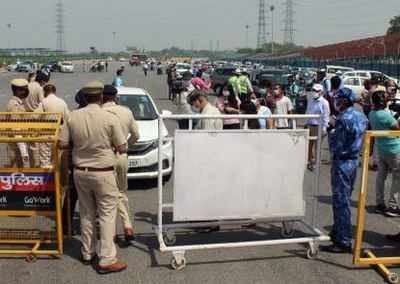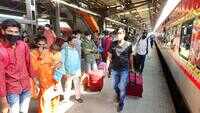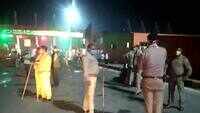
GURUGRAM: Since May 1, when the Gurugram-Delhi border was officially ‘sealed’, more than 1,300 industries in the city have received permission to reopen, auto giants Maruti and Hero have restarted their plants, the decks have been cleared for around 1 lakh factory workers to return to work, cabs have been allowed, passenger trains are running again, and we have arrived within a week of Lockdown 4.0, which is expected to further open up the economy.
The border, however, remains ‘sealed’, slowing down or stalling efforts to restart business activity, or even effectively running hospitals, a strategy that doctors fear is ending up affecting the fight against the pandemic and businessmen say is an obstacle in the way of a move towards more economic activity, on which millions of livelihoods depend.
The border restrictions enforced by Haryana’s NCR districts have also come under the scrutiny of the Delhi high court, which has agreed to examine their legal validity. But the state government is yet to budge from its decision.
Additional chief secretary and GMDA chief VS Kundu told TOI on Tuesday, “Gurugram will not open its border now. Interstate commuting is not allowed. Health professionals who are in Delhi will have to apply to district administration for commuting pass.”
The decision to ‘seal’ the borders was taken after the state’s home minister, Anil Vij, claimed “corona carriers” from Delhi were bringing the infection into Haryana. Following Vij’s statement, Gurugram, Faridabad, Sonepat and Jhajjar put stringent restrictions on movement of people to and from Delhi, including doctors and other health workers.
In an order dated April 15 and updated on May 11, the Union home ministry directed governments of states and UTs to ensure unhindered movement of healthcare professionals, nurses, paramedical staff and sanitation workers to help address the public health urgency arising from the spread of the novel coronavirus.
On Tuesday, Faridabad permitted the passage of doctors, nurses and other medical staff into and out of the district. Gurugram hasn’t, and there have been no clear orders from the Haryana government on this.
The experience of Dr Mohammed Hasnain Reza, head of emergency services, Fortis Memorial Research Institute, is a case in point. “On the one hand, it was a positive step, as it was done to bring down the transmission of disease; on the other, it has led to difficulties in running emergency medical services in Gurugram,” Dr Reza told TOI. “Many in my department could not turn up for duty because of this, which made it difficult to treat patients who were to be given essential treatment -- on two occasions, I had to return as I was not allowed to enter Gurugram,” he added.
When economic activity is being revived by the state government, the border curbs have perplexed industrialists. “One of the points we had discussed in our meeting with the chief minister was that cross-border restrictions should be removed. However, those have been maintained for now which is causing problems for our industries, as many exporters and their employees live in Delhi and are unable to come to Gurugram,” explained Manoj Jain, an industrialist and member of the Gurugram Industrial Association.
Besides forcing hundreds of essential service providers to be absent from work, the closed border is keeping families apart. A Delhi Police sub-inspector, whose wife is a cop in Gurugram police, has been unable to see his family in Gurugram. “From the day the border was sealed, Gurugram police has denied us entry. I am living in Delhi at a temporary accommodation while my wife and kids are in Gurugram,” the cop, requesting anonymity, said. “It is difficult to be away from family in such a situation.”
And though most companies have advised their employees to work from home, there are others, the many who live in Delhi but travel to Gurugram for work, for whom the intransigence of the Haryana authorities is actively coming in the way of their livelihoods.
And if the CM’s words on Wednesday evening are any indication, there’s little relief in sight. Manohar Lal Khattar expressed deep concern over the recent surge in Covid-19 cases in Delhi. “In the first week of May, we saw a sudden spike in the number of cases in districts neighbouring Delhi like Gurugram, Faridabad, Sonepat and Jhajjar. Due to this, our ranking in recovery rate also declined,” said Khattar. “While we were next to Kerala in recovery rate last month, we have come down on that parameter due to recent cases.”
A cop at the border insisted that no one with a pass or train ticket is being told to turn back. “If someone has booked a ticket, they can just show the ticket and go. In case someone has gone to drop a person at the railway station, they are also being allowed,” he claimed.
Still, no latitude is being shown in other instances. There is a handful of infrastructure projects pending in the city, work on which cannot move ahead without site managers (and heavy machinery) being present. Officials from the National Highways Authority of India (NHAI) argue that the Centre’s relaxations have been rendered useless by stringent border-sealing.
“For the elevated U-turn at Shankar Chowk, we need to move machines. Neither the cops are allowing wrong-side movement nor are they letting us cross Sirhaul border and enter back again in the city,” protested an NHAI official. “Similarly, the movement of officials has also been curbed. In such a scenario, what’s the point of resuming construction work?”
As Indians slowly accept the reality of living with the coronavirus, prolonged checks on movement will only post more obstacles in the road to recovery. Of course, safeguards must remain, but the answer lies in stringent cluster containment, screening and expansion of testing rather than keep the borders closed of two cities as conjoined as Delhi and Gurugram are.
The border, however, remains ‘sealed’, slowing down or stalling efforts to restart business activity, or even effectively running hospitals, a strategy that doctors fear is ending up affecting the fight against the pandemic and businessmen say is an obstacle in the way of a move towards more economic activity, on which millions of livelihoods depend.
The border restrictions enforced by Haryana’s NCR districts have also come under the scrutiny of the Delhi high court, which has agreed to examine their legal validity. But the state government is yet to budge from its decision.
Additional chief secretary and GMDA chief VS Kundu told TOI on Tuesday, “Gurugram will not open its border now. Interstate commuting is not allowed. Health professionals who are in Delhi will have to apply to district administration for commuting pass.”
The decision to ‘seal’ the borders was taken after the state’s home minister, Anil Vij, claimed “corona carriers” from Delhi were bringing the infection into Haryana. Following Vij’s statement, Gurugram, Faridabad, Sonepat and Jhajjar put stringent restrictions on movement of people to and from Delhi, including doctors and other health workers.
In an order dated April 15 and updated on May 11, the Union home ministry directed governments of states and UTs to ensure unhindered movement of healthcare professionals, nurses, paramedical staff and sanitation workers to help address the public health urgency arising from the spread of the novel coronavirus.
On Tuesday, Faridabad permitted the passage of doctors, nurses and other medical staff into and out of the district. Gurugram hasn’t, and there have been no clear orders from the Haryana government on this.
The experience of Dr Mohammed Hasnain Reza, head of emergency services, Fortis Memorial Research Institute, is a case in point. “On the one hand, it was a positive step, as it was done to bring down the transmission of disease; on the other, it has led to difficulties in running emergency medical services in Gurugram,” Dr Reza told TOI. “Many in my department could not turn up for duty because of this, which made it difficult to treat patients who were to be given essential treatment -- on two occasions, I had to return as I was not allowed to enter Gurugram,” he added.
When economic activity is being revived by the state government, the border curbs have perplexed industrialists. “One of the points we had discussed in our meeting with the chief minister was that cross-border restrictions should be removed. However, those have been maintained for now which is causing problems for our industries, as many exporters and their employees live in Delhi and are unable to come to Gurugram,” explained Manoj Jain, an industrialist and member of the Gurugram Industrial Association.
Besides forcing hundreds of essential service providers to be absent from work, the closed border is keeping families apart. A Delhi Police sub-inspector, whose wife is a cop in Gurugram police, has been unable to see his family in Gurugram. “From the day the border was sealed, Gurugram police has denied us entry. I am living in Delhi at a temporary accommodation while my wife and kids are in Gurugram,” the cop, requesting anonymity, said. “It is difficult to be away from family in such a situation.”
And though most companies have advised their employees to work from home, there are others, the many who live in Delhi but travel to Gurugram for work, for whom the intransigence of the Haryana authorities is actively coming in the way of their livelihoods.
And if the CM’s words on Wednesday evening are any indication, there’s little relief in sight. Manohar Lal Khattar expressed deep concern over the recent surge in Covid-19 cases in Delhi. “In the first week of May, we saw a sudden spike in the number of cases in districts neighbouring Delhi like Gurugram, Faridabad, Sonepat and Jhajjar. Due to this, our ranking in recovery rate also declined,” said Khattar. “While we were next to Kerala in recovery rate last month, we have come down on that parameter due to recent cases.”
A cop at the border insisted that no one with a pass or train ticket is being told to turn back. “If someone has booked a ticket, they can just show the ticket and go. In case someone has gone to drop a person at the railway station, they are also being allowed,” he claimed.
Still, no latitude is being shown in other instances. There is a handful of infrastructure projects pending in the city, work on which cannot move ahead without site managers (and heavy machinery) being present. Officials from the National Highways Authority of India (NHAI) argue that the Centre’s relaxations have been rendered useless by stringent border-sealing.
“For the elevated U-turn at Shankar Chowk, we need to move machines. Neither the cops are allowing wrong-side movement nor are they letting us cross Sirhaul border and enter back again in the city,” protested an NHAI official. “Similarly, the movement of officials has also been curbed. In such a scenario, what’s the point of resuming construction work?”
As Indians slowly accept the reality of living with the coronavirus, prolonged checks on movement will only post more obstacles in the road to recovery. Of course, safeguards must remain, but the answer lies in stringent cluster containment, screening and expansion of testing rather than keep the borders closed of two cities as conjoined as Delhi and Gurugram are.

Coronavirus outbreak
Trending Topics
LATEST VIDEOS
More from TOI
Navbharat Times
Featured Today in Travel
Quick Links
Kerala Coronavirus Helpline NumberHaryana Coronavirus Helpline NumberUP Coronavirus Helpline NumberBareilly NewsBhopal NewsCoronavirus in DelhiCoronavirus in HyderabadCoronavirus in IndiaCoronavirus symptomsCoronavirusRajasthan Coronavirus Helpline NumberAditya ThackerayShiv SenaFire in MumbaiAP Coronavirus Helpline NumberArvind KejriwalJammu Kashmir Coronavirus Helpline NumberSrinagar encounter
Get the app







